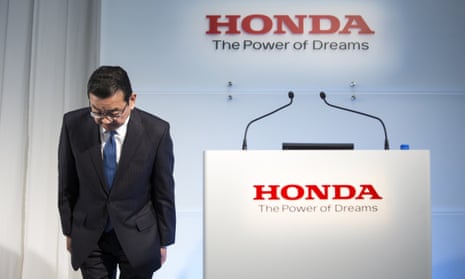Claims that Brexit had nothing to do with Honda closing its only UK manufacturing plant are “fanciful”, according to a former British ambassador to Japan.
The Japanese government has become increasingly vocal in recent weeks about the damage a no-deal Brexit would cause, while a number of big Japanese corporations have announced restructures. The Japanese foreign minister, Taro Kono, said on Tuesday that it was “absolutely necessary” for the UK to avoid crashing out of the European Union without a deal.
Honda announced on Tuesday that it would close its Swindon manufacturing plant in 2021, bringing with it the direct loss of 3,500 jobs and potentially thousands more in the supply chain.
Honda cited “unprecedented changes” in the automotive industry and said it was “not a Brexit-related issue for us”. This point was reiterated by Justin Tomlinson, the Conservative MP for North Swindon and Brexit backer.
But Sir David Warren, the British ambassador to Japan from 2008 to 2012, told the Guardian: “The idea that Brexit uncertainty is irrelevant to this is fanciful. How are Honda supposed to calculate the costs and benefits of staying in the UK in the overall global context against such lack of clarity on the future terms of trade?”
Warren said Brexit supporters who seized on Honda’s statement were missing the point. With five weeks to go to the deadline, the UK was yet to clarify whether it would leave the EU without any deal, or on the basis of a deal that simply deferred discussion of trading terms to the next stage of negotiations.
The Japanese government would be “privately conscious of the danger of the massively important UK/Japan trade and investment relationship – and other foreign direct investment – being held hostage by an internal debate within the Conservative party that it is proving difficult to resolve”.
Fukunari Kimura, an economics professor at Keio University in Tokyo, said: “We do not even know what tariffs would be applied after March; firms cannot make any decisions but a simple withdrawal on how to reformulate production networks.”
Another factor, Warren said, was the recently completed EU-Japan trade deal giving Japanese car exporters tariff-free access to European markets by 2027.
